Russia Faces 'Failures' With Iranian Drones, Says US Official

Russia has faced "numerous failures" with Iranian-made drones acquired from Tehran this month for use in Ukraine, Reuters reported quoting a US official.

Russia has faced "numerous failures" with Iranian-made drones acquired from Tehran this month for use in Ukraine, Reuters reported quoting a US official.
The official, who spoke on condition of anonymity, said the United States assesses Russia has received the delivery of Mohajer-6 and Shahed-series unmanned aerial vehicles (UAVs) over several days this month. The official said it is likely part of a Russian plan to acquire hundreds of such vehicles.
"We assess that Russia intends to use these Iranian UAVs, which can conduct air-to-surface attacks, electronic warfare, and targeting, on the battlefield in Ukraine," the official said.
Iran is a close ally of Russia and its ruler Ali Khamenei openly praised Vladimir Putin for his invasion of Ukraine.
In July, US National Security Adviser Jake Sullivan told reporters the US has information that shows Iran is preparing to provide Russia with up to several hundred drones.
The Biden administration last month released satellite imagery indicating that Russian officials visited Kashan Airfield on June 8 and July 5 to view the Iranian drones.
Iran's foreign minister, Hossein-Amir Abdollahian, never denying these reports, said last month that Tehran had "various types of collaboration with Russia, including in the defense sector."
On Monday, Ukraine said it broke through enemy lines in several places near the southern city of Kherson as it pressed a new campaign to retake territory. Moscow said Kyiv's counter-offensive had failed as Russia shelled the port city of Mykolaiv.
Reporting by Reuters
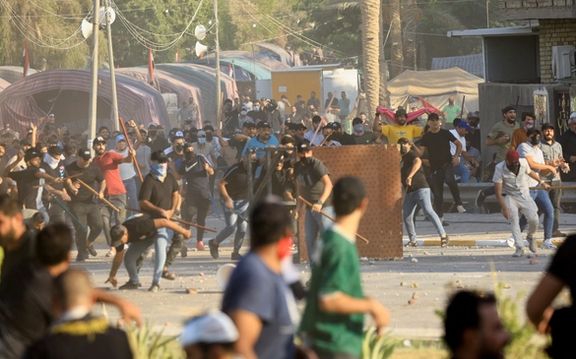
Clashes between supporters of Moqtada al-Sadr and security forces were reported Monday in Iraq after the cleric announced his retirement from politics.
The government announced the postponement of a cabinet meeting, while Iran International’s correspondent in Iraq reported Sadrists storming governorate buildings in provinces including Basrah, south Iraq, and Maysan, also bordering Iran. They were chanting slogans against Iran and its interference in Iraqi politics. Fierce clashed also took place between Sadr's supporters and pro-Iranian groups.
Wary of a deteriorating security situation, the Iranian embassy warned nationals not to go to Kazimayn and Samarah, Shia shrines, and if in Najaf or Kerbalah to stay put.
Sadr – whose role in Iraqi politics goes back to the days of Saddam Hussein, overthrown by the United States-led 2003 invasion – won 73 of 329 seats in last October’s parliamentary election but has been unable to gain office after months of political haggling that has failed to produce a new administration.
The Sadrists withdrew from parliament June 13, prompting supporters to storm the building in July and to remain encamped outside ever since. Sadr’s announcement Monday of his ‘retirement’ enflamed supporters, with some storming government buildings in the fortified ‘green zone,’ central Baghdad.
AFP news agency reported shots being fired, possibly just in the air, and security forces using tear gas. The official news agency INA announced that military authorities had set a full curfew in Baghdad from 3.30pm local time.
Updates from out correspondent in Iraq said that widespread armed clashes errupted after dark between Sadr's militia and pro-Iran armed groups in Baghdad and Basra.
Risk of violent conflict?
After earlier ‘retirements,’ Sadr has returned to politics, and there have been suggestions he is trying to strengthen his negotiating hand over a new government rather than either stepping aside or even trying to seize power. Mustafa al-Kadhimi, caretaker prime minister since May 2020, is sympathetic to Sadr while not an ally.
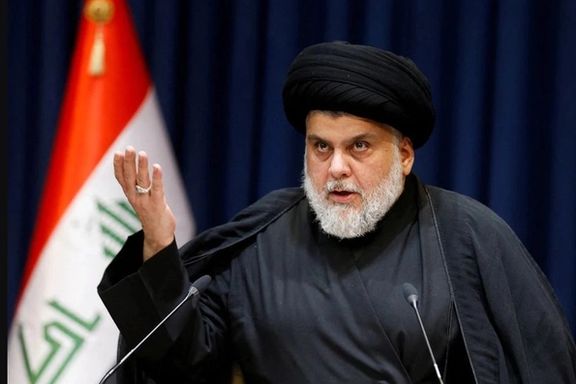
Sadr has a long record of populism, based on active social-welfare networks built up from those of his father, Ayatollah Mohammad Sadeq al-Sadr, who was assassinated in Najaf in 1999. Moqtada Sadr’s Mehdi Army, originally active in resisting the post-2003 US occupation, is now formally part of the Iraqi armed forces alongside other Shia militia.
At various times Sadr has appeared close to Iran, but has more often positioned himself as an ardent Iraqi nationalist wanting to curb both Iranian and US influence. Some US-based analysts have suggested Washington should ally with Sadr against Iraqi groups closer to Tehran they call ‘proxies’, while other analysts have warned that Sadr brings the risk of Iraq falling into violent conflict.
The Coordination Framework, a Shia-led bloc including the Patriotic Union of Kurdistan and some Sunni groups, regards Sadr as an unpredictable firebrand. Common opposition to Sadr, despite other differences, holds the bloc together.
There have also been reports that Washington has tried in recent days to pressure Sadr to resolve differences with other Iraqi groups. Ambassador Alina Romanowski August 24 expressed concern to President Barham Saleh over Sadrists preventing courts functioning by protesting outside judiciary buildings.
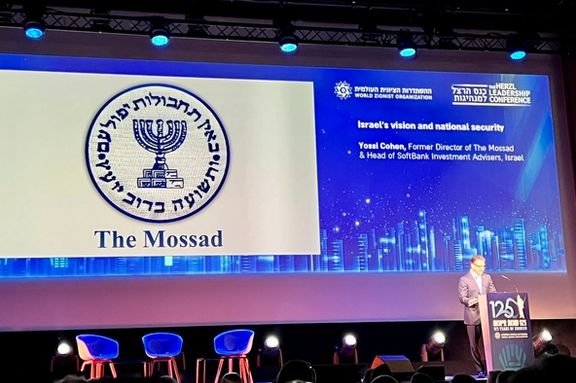
Former Mossad director Yossi Cohen says Israel carried out “countless operations” against Iran’s nuclear program when he led the spy agency.
Speaking during an event in Switzerland’s Basel on Monday to mark 125 years since the First Zionist Congress, Cohen denounced the emerging nuclear accord between Iran and world powers, saying that Israel “will continue to do whatever needs to be done” to prevent Iran from acquiring nuclear arms if a deal is signed.
“Without going into too many details, I can tell you the Mossad had many successes in the fight against Iran’s nuclear program,” he said, adding, “We operated around the world and on Iranian soil itself. In the very heartland of the ayatollahs.”
He mentioned as an example the 2018 operation to snatch a trove of Iranian documents -- including draft designs for a nuclear warhead -- which proved Tehran has lied about the military dimensions of its atomic program. "The Iranian regime is lying to the whole world, and we proved it when we brought thousands of documents from the Iranian archives, documents that proved that the Iranians lied to the International Atomic Energy Agency."
“We can never allow a regime that calls for our destruction to get its finger on the nuclear trigger,” Cohen warned.
Earlier in the day, Israeli President Isaac Herzog urged the IAEA to continue its probe of Iran, after President Ebrahim Raisi threatened Israel and said Tehran won’t return to the 2015 nuclear deal unless the UN watchdog stops its investigation into uranium traces found at unexplained sites. “The IAEA’s independence is critical. It should be strictly adhered to, including its ability to investigate violations of nuclear developments in Iran,” Herzog said in Bern at a press conference with Swiss President Ignazio Cassis.
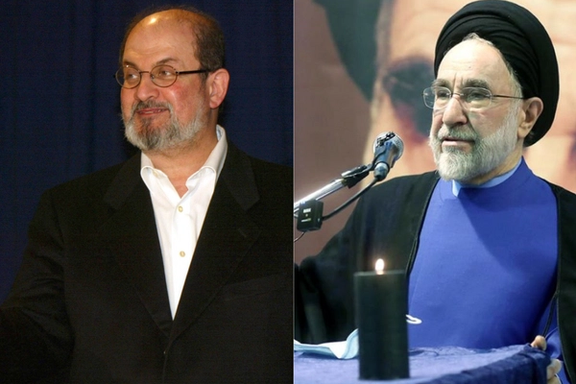
A new report has revealed that Iran’s former President Mohammad Khatami had a role in issuing the fatwa by Islamic Republic’s founder Rouhollah Khomeini against author Salman Rushdie.
According to a report by BBC, Khatami – then a minister -- held a meeting with two Pakistani-British Islamic scholars, Kalim Siddiqui and Ghayasuddin Siddiqui, just hours before Khomeini issued the fatwa, a formal proclamation that called for the murder of Rushdie. Before the February 1989 decree, Iran had largely ignored the Satanic Verses, the controversial book that brought about 30 years of death threats for the novelist.
The two Sunni clerics had arrived at Tehran’s Mehrabad Airport to get home to the UK after attending a conference in the Iranian capital to mark a decade since the country's Islamic Revolution. Inside the airport, they bumped into Khatami -- who asked to have a private word with Kalim. "They went to a corner and chatted," Ghayasuddin later explained in the BBC's 2009 documentary, recounting that "He (Khatami) was asking my view about Salman Rushdie - and I told him, 'You know, something drastic has to happen.'"
Khatami then met with Khomeini, and a few hours later the fatwa was issued, not only against Rushdie but also its publishers, editors and translators, reportedly without Khomeini even reading the novel. "I call on all valiant Muslims wherever they may be in the world to kill them without delay" it read.
Kalim later said he believed he may have been "partially responsible" for the fatwa. In 2019, Ed Husain, a writer on religion and extremism, said that Khomeini had not been minded to do anything about Rushdie; it had been the British imam who had urged the autocratic political and religious leader that he "must do something for the Muslims".
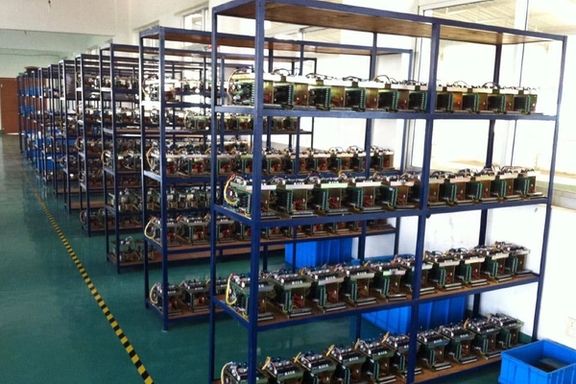
Iran has officially approved the use of cryptocurrency for imports as a measure to circumvent US sanctions imposed on its finance and banking sector.
Industry, Mines and Trade Minister Reza Fatemi Amin said on Monday that the regulations for using cryptocurrencies instead of dollar and euro was finalized by the administration on Sunday.
"All the issues related to crypto-assets, including how to provide fuel and energy, and how to assign and grant licenses were devised," he added.
The use of cryptocurrencies in imports is one of the ways to circumvent sanctions because cryptocurrencies are not traded through normal channels such as banks and it is very difficult to track them.
Earlier in the month, Iran made its first official import cryptocurrency order, worth $10 million, as a test run for allowing the country to trade through digital assets that bypass the dollar-dominated global financial system and to trade with other countries similarly embargoed by US sanctions, such as Russia.
"By the end of September, the use of cryptocurrencies and smart contracts will be widely used in foreign trade with target countries," said Alireza Peymanpak, a deputy Iranian trade minister who leads Iran’s Trade Promotion Organization (TPO).
Iran has a complex relationship with cryptocurrencies, which have helped hide various kinds of illicit trades banned by US and other European sanctions but creating them is highly energy-intensive. In 2019, Iran’s central bank banned trading of cryptocurrencies inside the country but the government allowed the use of cryptocurrencies like bitcoin to pay for imports.
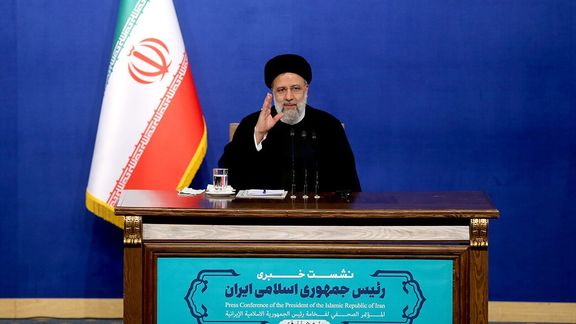
Iran’s President Ebrahim Raisi said at a briefing Monday that he has no plans to meet with The US President at the UN General Assembly in New York in September.
“I said no at the previous briefing in response to a similar question and I'm repeating it again: meeting with [the US President Joe] Biden has no benefit for Iran or the Iranian people. There is no plan for such a meeting and there will not be in the future,” the Iranian president said at the briefing in Tehran attended by local and foreign reporters.
Elsewhere in his briefing,Raisi underlined that Tehran and Beijing are both determined to broaden their relations, especially in commercial and economic areas and said Iran will not allow bilateral ties with China to be affected by globaland other issues.”
Referring to the 25-year comprehensive cooperation agreement between the two countries, he stressed Tehran’s determination to implement the deal.
Raisi also reiterated the importance of Iran's presence in the Shanghai Cooperation Organization (SCO)and said corporation with its members will help Iran connect to Asia’s economic infrastructures and have its fair share of trade in the region.
In response to questions regarding the nuclear issue, Raisi said no one can “deprive the Iranian nation of its inalienable right to access peaceful nuclear technology.”
The Iranian president also said Iran has managed to access some of its frozen assets under the US sanctions and demanded the release of the rest of assets frozen abroad. Iran claimed in July that it had received some funds frozen in Iraq.
Raisi said the Iranian team will not leave the negotiating table in the talks on reviving the 2015 nuclear deal, officially known as the Joint Comprehensive Plan of Action (JCPOA), but reaching an agreement, hinges on the settlement of safeguards issues between Iran and the International Atomic Energy Agency (IAEA).
“Negotiations are for the sake of removing the sanctions. Those who abandoned their commitments should return and fulfil their obligations. Our emphasis in these negotiations is on the removal of sanctions.”
Referring to Israel’s threats against Iran, he said that the assassinationof the country’s nuclear scientists was aimed at stopping it runs progress in nuclear technologyand added that Israel is not capable of “protecting itself against Palestinian people’s stone-throwing, let alone their precision strike missiles.
Commenting on Tehran relations with neighboring countries and allies Raisi said Tehran and Moscow enjoy strategic cooperation in various areas. "Our cooperation with Russia is strategic and is defined in economic, commercial, energy, air and space fields, and many other issues,” he said, adding that the issue of the North-South Corridor is on the agenda of talks with Moscow.
Raisi noted that negotiations between senior representatives from Iran and Saudi Arabia have continued in the Iraqi capital Baghdad to resolve differences and to restore diplomatic relations and described relations between Tehran and Ankara as good. “Turkish President Recep Tayyip Erdogan has promised to pursue joint water diplomacy with neighbors,” he said.